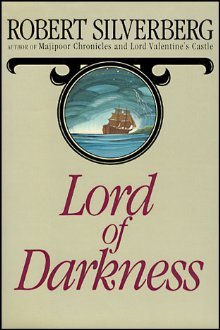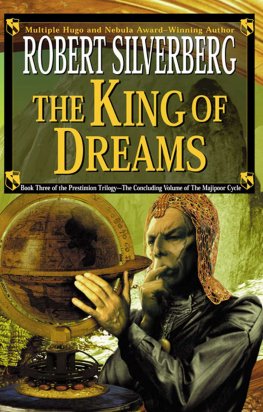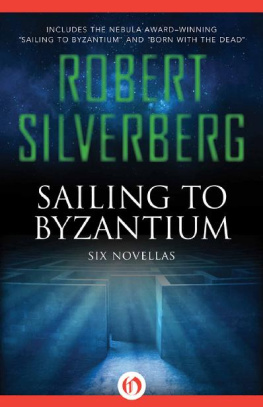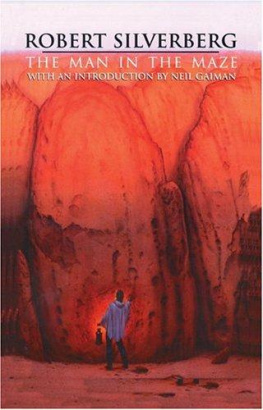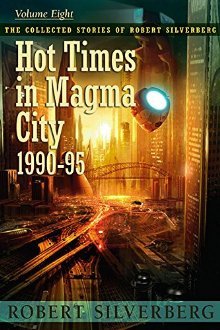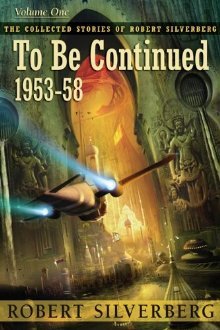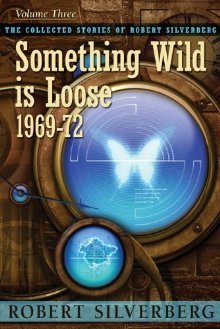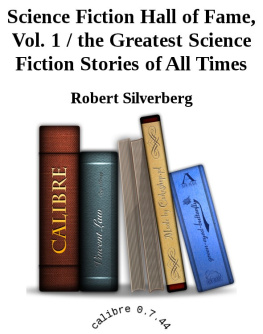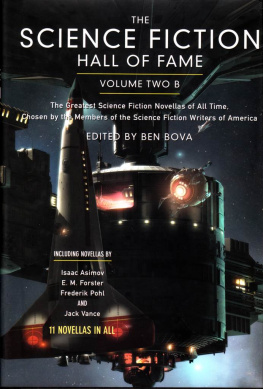Robert Silverberg - The Science Fiction Hall of Fame
Here you can read online Robert Silverberg - The Science Fiction Hall of Fame full text of the book (entire story) in english for free. Download pdf and epub, get meaning, cover and reviews about this ebook. year: 2009, publisher: Subterranean Press, genre: Science fiction. Description of the work, (preface) as well as reviews are available. Best literature library LitArk.com created for fans of good reading and offers a wide selection of genres:
Romance novel
Science fiction
Adventure
Detective
Science
History
Home and family
Prose
Art
Politics
Computer
Non-fiction
Religion
Business
Children
Humor
Choose a favorite category and find really read worthwhile books. Enjoy immersion in the world of imagination, feel the emotions of the characters or learn something new for yourself, make an fascinating discovery.
- Book:The Science Fiction Hall of Fame
- Author:
- Publisher:Subterranean Press
- Genre:
- Year:2009
- ISBN:978-1-59606-212-2
- Rating:5 / 5
- Favourites:Add to favourites
- Your mark:
- 100
- 1
- 2
- 3
- 4
- 5
The Science Fiction Hall of Fame: summary, description and annotation
We offer to read an annotation, description, summary or preface (depends on what the author of the book "The Science Fiction Hall of Fame" wrote himself). If you haven't found the necessary information about the book — write in the comments, we will try to find it.
The Science Fiction Hall of Fame — read online for free the complete book (whole text) full work
Below is the text of the book, divided by pages. System saving the place of the last page read, allows you to conveniently read the book "The Science Fiction Hall of Fame" online for free, without having to search again every time where you left off. Put a bookmark, and you can go to the page where you finished reading at any time.
Font size:
Interval:
Bookmark:
The Science Fiction Hall of Fame
by Robert Silverberg
The look his remote grey eyes was haunted, terrified, beaten, as he came running in from the Projectorium. His shoulders were slumped; I had never before seen him betray the slightest surrender to despair, but now I was chilled by the completeness of his capitulation. With a shaking hand he thrust at me a slender yellow data slip, marked in red with the arcane symbols of cosmic computation. No use, he muttered. Theres absolutely no use trying to fight any longer!
You mean
Tonight, he said huskily, the universe irrevocably enters the penumbra of the null point!
The day Armstrong and Aldrin stepped out onto the surface of the moonit was Sunday, July 20, 1969, remember?I stayed home, planning to watch the whole thing on television. But it happened that I met an interesting woman at Leon and Helenes party the night before, and she came home with me. Her name is gone from my mind, if I ever knew it, but I remember how she looked: long soft golden hair, heart-shaped face with prominent ruddy cheeks, gentle gray-blue eyes, plump breasts, slender legs. I remember, too, how she wandered around my apartment, studying the crowded shelves of old paperbacks and magazines. Youre really into sci-fi, arent you? she said at last. And laughed and said, I guess this must be your big weekend, then! Wow, the moon! But it was all a big joke to her, that men should be cavorting around up there when there was still so much work left to do on earth. We had a shower and I made lunch and we settled down in front of the set to wait for the men to come out of their module, andvery easily, without a sense of transitionwe found ourselves starting to screw, and it went on and on, one of those impossible impersonal mechanical screws in which body grinds against body for centuries, no feeling, no excitement, and as I rocked rhythmically on top of her, unable either to come or to quit, I heard Walter Cronkite telling the world that the module hatch was opening. I wanted to break free of her so I could watch, but she clawed at my back. With a distinct effort I pulled myself up on my elbows, pivoted the upper part of my body so I had a view of the screen, and waited for the ecstasy to hit me. Just as the first wavery image of an upside-down spaceman came into view on that ladder, she moaned and bucked her hips wildly and went into frenzied climax. I felt nothing. Nothing. Eventually she left, and I showered and had a snack and watched the replay of the moonwalk on the eleven oclock news. And still I felt nothing.
What is the answer? said Gertrude Stein, about to die. Alice B. Toklas remained silent. In that case, Miss Stein went on, what is the question?
Extract from History of the Imperium, Koeckert and Hallis, third edition (revised):
The galactic empire was organized 190 standard universal centuries ago by the joint, simultaneous, and unanimous resolution of the governing bodies of eleven hundred worlds. By the present day the hegemony of the empire has spread to thirteen galactic sectors and embraces many thousands of planets, all of which entered the empire willingly and gladly. To remain outside the empire is to confess civic insanity, for the Imperium is unquestionably regarded throughout the cosmos as the most wholly sane construct ever created by the sentient mind. The decision-making processes of the Imperium are invariably determined by recourse to the Hermosillo Equations, which provide unambiguous and incontrovertibly rational guidance in any question of public policy. Thus the many worlds of the empire form a single coherent unit, as perfectly interrelated socially, politically, and economically as its component worlds are interrelated by the workings of the universal laws of gravitation.
Perhaps I spend too much time on other planets and in remote galaxies. Its an embarrassing addiction, this science fiction. (Horrible jingle! It jangles in my brain like an idiots singsong chant.) Look at my bookshelves: hundreds of well-worn paperbacks, arranged alphabetically by authors, Aschenbach-Barger-Capwell-De Soto-Friedrich, all the greats of the genre out to Waldman and Zenger. The collection of magazines, every issue of everything back to the summer of 1953, a complete run of Nova, most issues of Deep Space, a thick file of Tomorrow. I suppose some of those magazines are quite rare now, though Ive never looked closely into the feverish world of the s-f collector. I simply accumulate the publications I buy at the newsstand, never throwing any of them away. How could I part with them? Slices of my past, those magazines, those books. I can give dates to changes in my spirit, alterations in my consciousness, merely by picking up old magazines and reflecting on the associations they evoke. The issue showing the ropy-armed purple monster: it went on sale the month I discovered sex. This issue, cover painting of exploding spaceships: I read it my first month in college, by way of relief from Aquinas and Plato. Mileposts, landmarks, waterlines. An embarrassing addiction. My friends are good-humored about it. They think science fiction is a literature for childrenGod knows, they may be rightand they indulge my fancy for it in an affectionate way, giving me some fat anthology for Christmas, leaving a stack of current magazines on my desk while Im out to lunch. But they wonder about me. Sometimes I wonder too. At the age of thirty-four should I still be able to react with such boyish enthusiasm to, say, Capwells Solar League novels or Waldmans Mindleech series? What is there about the present that drives me so obsessively toward the future? The gray and vacant present, the tantalizing, inaccessible future.
His eyes were glittering with irrepressible excitement as he handed her the gleaming yellow dome that was the thought-transference helmet. Put it on, he said tenderly.
Im afraid, Riik.
Dont be. Whats there to fear?
Myself. The real me. Ill be wide open, Riik. I fear what you may see in me, what it may do to you, to us.
Is it so ugly inside you? he asked.
Sometimes I think so.
Sometimes everybody thinks that about himself, Juun. Its the old neurotic self-hatred welling up, the garbage that we cant escape until were totally sane. Youll find that kind of stuff in me, too, once we have the helmets on. Ignore it. It isnt real. It isnt going to be a determining factor in our lives.
Do you love me, Riik?
The helmet will answer that better than I can.
All right. All right. She smiled nervously. Then with exaggerated care she lifted the helmet, put it in place, adjusted it, smoothed a vagrant golden curl back under the helmets rim. He nodded and donned his own.
Ready? he asked.
Ready.
Now!
He threw the switch. Their minds surged toward one another.
Then
Oneness!
My mind is cluttered with other mens fantasies: robots, androids, starships, giant computers, predatory energy globes, false messiahs, real messiahs, visitors from distant worlds, time machines, gravity repellers. Punch my buttons and I offer you parables from the works of Hartzell or Marcus, appropriate philosophical gems borrowed from the collected editorial utterances of David Coughlin, or concepts dredged from my meditations on De Soto. I am a walking mass of secondhand imagination. I am the flesh-and-blood personification of the Science Fiction Hall of Fame.
At last, cried Professor Kholgoltz triumphantly. The machine is finished! The last solenoid is installed! Feed power, Hagley. Feed power! Now we will have the Answer we have sought for so many years!
He gestured to his assistant, who gradually brought the great computer throbbingly to life. A subtle, barely perceptible flow of energy pervaded the air: the neutrino flux that the master equations had redicted. In the amphitheatre adjoining the laboratory, ten thousand people sat tensely frozen. All about the world, millions more, linked by satellite relay, waited with similar intensity. The professor nodded. Another gesture, and Hagley, with a grand flourish, fed the question tapeprogrammed under the supervision of a corps of multispan-trained philosophersinto the gaping jaws of the input slot.
Font size:
Interval:
Bookmark:
Similar books «The Science Fiction Hall of Fame»
Look at similar books to The Science Fiction Hall of Fame. We have selected literature similar in name and meaning in the hope of providing readers with more options to find new, interesting, not yet read works.
Discussion, reviews of the book The Science Fiction Hall of Fame and just readers' own opinions. Leave your comments, write what you think about the work, its meaning or the main characters. Specify what exactly you liked and what you didn't like, and why you think so.


